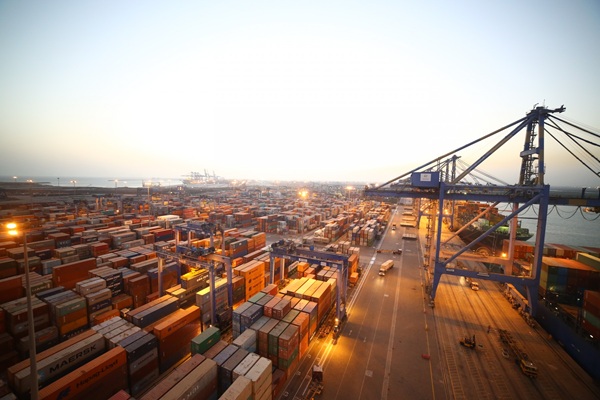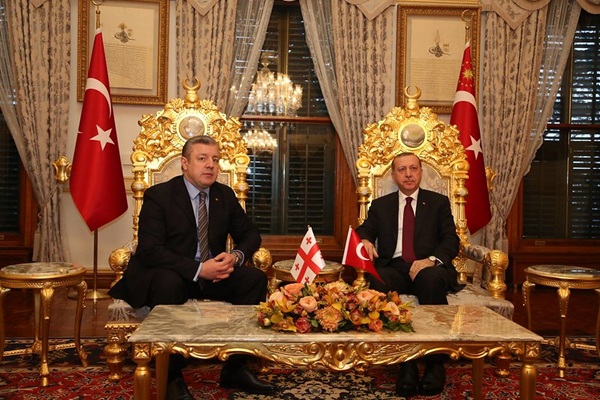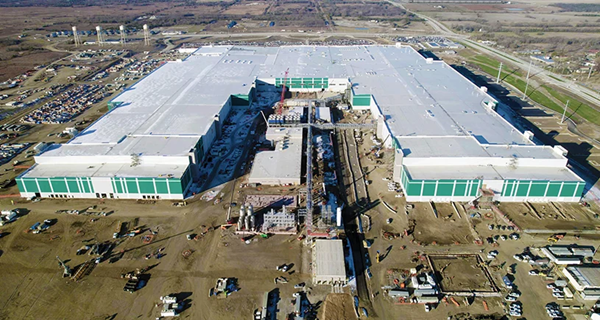1. Panasonic Energy opens new US EV battery factory
De Soto, Kansas – July 14, 2025 — Panasonic Energy Co., Ltd., a core company of the Panasonic Group, has officially launched mass production at its new state-of-the-art electric vehicle (EV) battery facility in De Soto, Kansas. This milestone marks a significant expansion of Panasonic’s U.S. manufacturing footprint and a major step forward in the global transition to sustainable transportation.
The De Soto factory, located just outside Kansas City, is now one of the largest automotive battery plants in North America. Built on a sprawling 300-acre site—equivalent to more than 225 American football fields—the facility is designed to produce Panasonic’s advanced 2170 cylindrical lithium-ion batteries, with a planned annual production capacity of approximately 32 gigawatt-hours (GWh).
This is Panasonic Energy’s second EV battery production site in North America, following the success of its Nevada Gigafactory, which has been operational since 2017 and currently produces around 41 GWh annually. Together, the two facilities are expected to boost Panasonic’s total U.S. battery production capacity to approximately 73 GWh, supporting the growing demand from automakers ramping up EV production.
A Strategic Investment in Innovation and Growth
The De Soto facility represents the largest private investment in Kansas history, underscoring Panasonic’s long-term commitment to regional economic development and clean energy innovation. The factory is expected to create up to 4,000 new jobs, contributing significantly to the local economy.
Equipped with cutting-edge automation—including rail-guided and autonomous guided vehicles—the plant is designed for high efficiency and precision. Panasonic estimates that the Kansas facility will achieve 20% higher productivity than its Nevada counterpart, thanks to labor-saving production lines and advanced manufacturing processes.
Supporting the EV Revolution
Panasonic Energy’s expansion aligns with the broader push toward electrification in the automotive industry. With over 30 years of experience in lithium-ion battery technology and more than 11 billion cells produced to date, the company is well-positioned to support the next generation of electric vehicles.
The De Soto plant will not only enhance Panasonic’s ability to meet the performance, range, and safety demands of EV manufacturers but also strengthen the resilience of the North American supply chain.
Looking Ahead
Panasonic plans to introduce next-generation battery materials at the Kansas facility, aiming to increase cell capacity by around 5% in the near future. This innovation, combined with the company’s dual-region production model in Japan and North America, positions Panasonic Energy as a key player in the global EV battery market.
As the world accelerates toward a cleaner, electrified future, the opening of the De Soto factory marks a pivotal moment for Panasonic, the state of Kansas, and the broader EV ecosystem.
2. DP World opens new facility in Mumbai

Navi Mumbai, India – Global logistics powerhouse DP World has taken a significant step in strengthening its Indian warehousing and cold chain infrastructure with the launch of a state-of-the-art facility in Taloja, Navi Mumbai. This strategic expansion underscores the company’s commitment to supporting India’s rapidly evolving consumption landscape, particularly in the pharmaceutical, FMCG, and quick-service restaurant sectors.
Spanning over 110,000 square feet, the new grade-A cold chain warehouse is equipped with 11,000 pallet positions and multiple temperature zones, enabling the secure storage and movement of perishable and temperature-sensitive goods. The facility is designed to meet the highest standards of hygiene, safety, and regulatory compliance, featuring advanced fire protection systems, thermal-sealed architecture, and real-time environmental monitoring.
Strategic Location and Connectivity
Situated just 8 km from the Taloja-Dombivli Road and within close proximity to Navi Mumbai Airport (39 km), JNPA Port (43 km), and key container freight stations, the warehouse offers seamless multimodal connectivity. This positions it as a critical logistics hub for Mumbai, Navi Mumbai, and the broader Western Maharashtra region.
Sustainability and Innovation at the Core
DP World has integrated cutting-edge technology and sustainability into the facility’s design. The warehouse uses next-generation refrigeration systems and eco-friendly refrigerants, ensuring energy efficiency and reduced emissions. These features align with the company’s broader environmental goals and its vision of building resilient, future-ready supply chains.
Anoop Chauhan, Vice President – Contract Logistics and Cold Chain at DP World Subcontinent, emphasised the facility’s role in meeting the rising demand for high-quality food and healthcare logistics. “Our new cold chain facility in Taloja delivers a future-ready solution to businesses. It combines sustainability, connectivity, and technology to help businesses grow in India’s evolving consumption landscape,” he said.
Expanding Footprint in India
This launch adds to DP World’s growing warehousing network in India, which now spans over 5 million square feet across 60+ locations. The company continues to integrate warehousing with port terminals, rail freight, freight forwarding, and express logistics to offer end-to-end supply chain solutions tailored to India’s dynamic market needs.
3. Irish tech consultancy firm Konversational enters US market

Irish technology consultancy firm Konversational has announced a major milestone in its international growth journey with the opening of its first U.S. office in New York City. This expansion marks the company’s entry into the North American market and is expected to generate over €5 million.
Founded in 2020 by former Accenture executives John Gilleran and Richard Guy, Konversational has rapidly grown into one of the leading ServiceNow partners in the UK and Ireland. The company specialises in customer service technology and digital workflow solutions, helping enterprises streamline operations and enhance customer experiences.
The New York office becomes Konversational’s seventh location, joining its existing hubs in Dublin, London, Paris, Nantes, Zurich, and Munich. The U.S. expansion follows the firm’s successful entry into continental Europe less than 18 months ago.
> “Expanding into the United States is a significant milestone for us and one that we have been building towards since opening our Dublin headquarters less than five years ago,” said John Gilleran, co-CEO of Konversational. “The U.S. market alone represents a tremendous growth opportunity for Konversational.”
Co-CEO Richard Guy added that the move is a “natural evolution” of the company’s growth trajectory, leveraging its European success to bring proven methodologies and talent to the world’s largest technology market.
The expansion is supported by Enterprise Ireland, which has played a key role in helping Irish firms scale internationally. Aidan McKenna, Regional Director for the Americas at Enterprise Ireland, praised Konversational’s achievements and its potential to drive digital transformation for U.S. businesses.
As Konversational sets its sights on the U.S., the company aims to replicate its European success by delivering market-leading services and leveraging its deep expertise in ServiceNow solutions.
4. Turkey and Georgia discuss increased trade

Tbilisi/Istanbul – July 21, 2025 — Turkey is setting its sights on significantly expanding its economic ties with neighboring Georgia, aiming to boost bilateral trade volume to $5 billion, according to a statement by Turkish Trade Minister Ömer Bolat.
Speaking at the Türkiye-Georgia Business Forum held in Tbilisi on July 16, Minister Bolat emphasised the robust and growing economic relationship between the two countries. The event was organised in collaboration with the Foreign Economic Relations Board (DEİK) and the Georgian Chamber of Commerce and Industry.
> “As a result of the Free Trade Agreement put into effect in 2008, our mutual trade has exceeded $3.5 billion annually,” Bolat noted, highlighting the strong foundation already in place.
Bolat was joined by Mariam Kvrivishvili, Georgia’s Minister of Economy and Sustainable Development, as the two nations reaffirmed their commitment to deepening commercial cooperation. The forum also served as a platform to discuss logistics, customs, and infrastructure development, particularly in the context of the Middle Corridor — a strategic trade route connecting Asia and Europe.
The minister pointed to the Baku-Tbilisi-Kars (BTK) Railway Data Exchange Agreement, signed in 2022, as a key enabler of smoother border crossings and enhanced trade logistics. “Türkiye-Georgia coordination is of great importance for the sustainability of the Middle Corridor,” he said.
In addition to trade in goods, Turkish contractors have played a significant role in Georgia’s infrastructure development, having undertaken 304 projects worth $5.6 billion to date.
During his visit, Bolat also met with President Mikheil Kavelashvili and Prime Minister Irakli Kobakhidze to discuss further steps in customs and logistics cooperation. “We comprehensively evaluated the steps taken in customs and logistics cooperation,” Bolat shared on social media following the meetings.
The $5 billion trade target reflects a broader regional strategy by Türkiye to strengthen economic integration with its neighbors and leverage its geographic position as a bridge between Europe and Asia.







